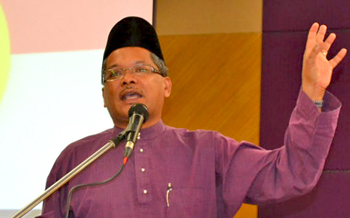Kuala Lumpur, Apr 6: A Malaysian MP said girls as young as nine were “physically and spiritually” ready for marriage, as the Muslim-majority Southeast Asian country passed a law on sexual offenses against children without criminalizing child marriage.
 Shabudin Yahaya, a member of the Barisan Nasional coalition, made the comments in response to a proposal by an opposition member of Parliament to amend the Sexual Offences Against Children bill to include a ban on child marriages.
Shabudin Yahaya, a member of the Barisan Nasional coalition, made the comments in response to a proposal by an opposition member of Parliament to amend the Sexual Offences Against Children bill to include a ban on child marriages.
The proposal was voted down by the majority of Parliament.
“They reach puberty at the age of nine or 12. And at that time, their body is already akin to them being 18 years old. So physically and spiritually, it is not a barrier for the girl to marry,” Yahaya said on Tuesday during a debate on the bill.
He also said there was “nothing wrong” with a rape victim marrying her rapist as she would then not face a “bleak future.” Yahaya's comments sparked outrage on social media, with some opposition politicians asking for him to be fired.
In a statement on Wednesday, Yahaya said his comments were taken out of context, and that marriage was not a “back door exit to legalize rape.” He said he rejected the motion to ban child marriages as it was contrary to provisions in Shariah law.
Under both civil law and Islamic law, girls and boys younger than 18 can be married. Civil law sets the minimum age of marriage at 18, but those above 16 can be married with the permission of their state's chief minister.
Under Islamic law, children younger than 16 can get married if the Shariah courts allow it. The law passed on Tuesday makes no mention of child marriage.
It criminalizes “grooming” — touching and befriending children as a prelude to sexual abuse — and spells out penalties for making and possessing pornography involving those under 18. A special court will also be set up under the new law to deal with child sexual abuse cases more quickly.
The maximum penalty under the law is a jail term of up to 30 years and six strokes of the whip for making, possessing or distributing child pornography.
The new law comes into effect 10 months after British pedophile Richard Huckle was found guilty of abusing up to 200 babies and children, mostly in Malaysia.
Reuters reported last year that most complaints of child sexual abuse in Malaysia do not lead to successful prosecutions, largely due to weaknesses in the criminal justice system.
Only 140 of the 12,987 cases of child sexual abuse reported to police between 2012 and July 2016 resulted in convictions.
“The law is more stringent now... but not enough,” Teo Nie Ching, the opposition MP who proposed the ban child marriages, told Reuters.
She said offenders would use the absence of a ban on child marriages to get away with crimes as marital rape is not a crime in Malaysia.
There have been several cases over the years of rapists marrying their victims, including those under 18, to avoid prosecution.





Comments
Add new comment